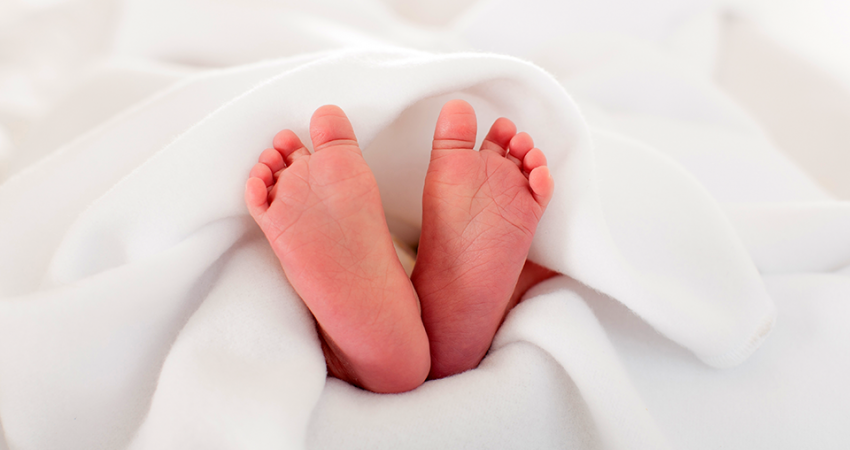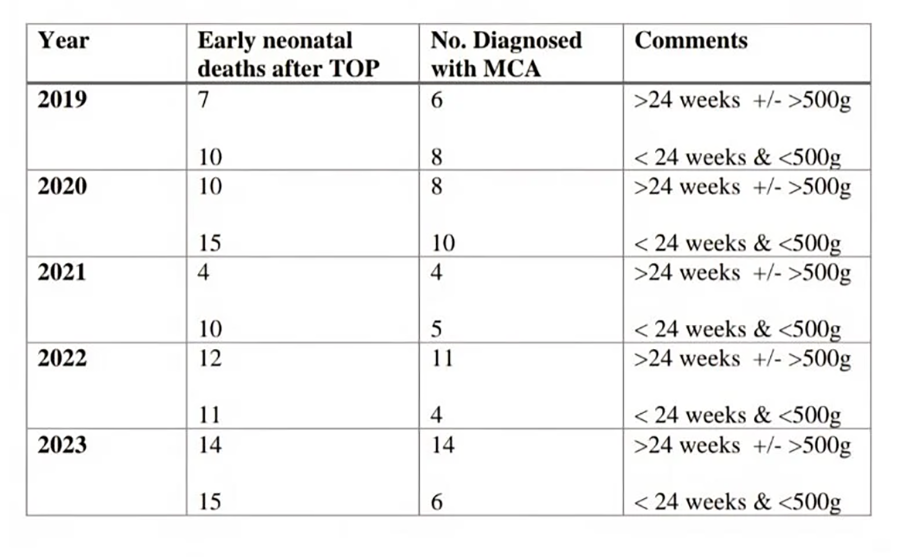
Calls for inquiry: 108 babies born alive then die after abortion
It is "barbaric" that 108 babies were born alive after abortion between 2019 and 2023 in Ireland, and that those who could have received life-saving interventions were 'clearly then left to die', a leading pro-life group has said, in a call for a full inquiry on "what is happening in relation to abortion provision in Ireland".
"We also need an open and honest debate on the increasingly horrific outcomes of abortion legislation which are repeatedly being swept under the carpet," Life Institute said.
Life Institute were amongst a host of national organisations and political figures who have called for a debate on the issue after figures released to Independent TD Mattie McGrath by the HSE in response to a parliamentary question showed that 108 babies were born alive following abortions in the five year period 2019-2023.
It is shown that in 2023, the most recent year for which data is available, 29 babies survived a termination procedure in that year alone, Life Institute spokeswoman Sandra Parda said.
The table (below) released to Deputy McGrath showed that there were 108 babies who were born and then recorded as an "early neonatal death" after Termination of Pregnancy (TOP).
While 17 babies were born alive after abortion in 2019m, that number had almost doubled to 29 in 2023 (figures for 2024/5 are not yet available, the HSE said) - with a total of 108 such cases in the 5 year period.
In addition, the data showed that 47 babies who were greater than 24 weeks gestation (approximately six months) and/or 500g at the time of the birth after abortion was listed as having suffered an early neonatal death after a termination of pregnancy.
Ms Parda said that it was "deeply disquieting and disturbing" to see that, in total, 32 babies had been aborted and then born alive although no major congenital anomaly had not been diagnosed: with 3 such deaths taking place in 2019, 7 in 2020, 5 in 2021, 8 in 2022 and 9 in 2023.
In addition, it was evident that 4 unborn babies who were more than 24 weeks gestation and/or more than 500g birthweight were aborted although there was no diagnosis of a major abnormality, she said.
"Were these babies simply left to die and were they denied the life-saving interventions that might have saved them," she asked.
"That would be completely barbaric: what kind of a health system, what kind of a society, would allow this to happen to the most vulnerable of all of our people, unborn babies? How could we have become so cruel, so indifferent to compassion, that would allow that to happen."
"We need answers, we need transparency," she said. "Looking at the evidence, clearly these babies are then simply being left to die, yet everything is shrouded in silence and secrecy."

Ms Parda said that the "legacy media and the political establishment are doing their utmost to ignore the horrendous reality of babies being born alive after late-term abortion - which has also been written up in a peer-reviewed journal - but this cruelty cannot continue to be hidden, the culture of denial must end".
"This must have been deeply distressing," Ms Parda. "What is happening in these cases? Were these babies diagnosed in the womb with an anomaly that they didn't have? Were they given any care after surviving a late-term abortion? We know that Baby Christopher was aborted in the National Maternity Hospital after a misdiagnosis in 2019, and that an apology was eventually issues after his parents fought long and hard for the truth, but in general everything to do with abortion provision in Ireland is shrouded in secrecy."
Deputy Mattie McGrath said he was "gravely concerned about any approach that reduces transparency around perinatal outcomes."
"The public deserves full clarity on how all pregnancy related deaths are recorded and reported. I will continue to seek assurances that the reporting system contains relevant data that is accessible and clearly presented," he said.
The Independent TD said that there was a "huge failure" amongst the government parties to face up to the reality of what has been ushered in by the 2019 abortion legislation.
"When pro-life TDs asked for caution and for transparency based on the experience of other countries, we were shouted down and name-called," he said.
"Now the media are silent and allowing the same government parties to elude questioning even when the HSE issues data that is deeply shocking," he added.
The latest figures suggest a significant increase in the total number of babies previously estimated to have born alive after abortion earlier - though the details released last year for 2022 indicated at least two babies were between 28 and 31 weeks gestation in that year alone.
LEFT 'BEGGING FOR HELP'
A 2020 peer-reviewed paper from UCC researchers examining the practice of late-term abortion noted that those carrying out abortion were frustrated by conflict with neonatologists and were “unclear” as to who will look after those babies’ if a baby was “born alive following an abortion by induction of labour and without feticide”.
This would leave the doctor who performed an unsuccessful late-term abortion “begging people to help” them provide palliative care if the baby survived, the study recorded.
The Pro-Life Campaign said that "the figures infer that 4 babies from 2019-2023 at over 24 weeks and/or 500g birthweight, survived the abortion with no indication of any congenital anomaly – suggesting that these could have been healthy babies. They were certainly at a gestation where survival with reasonable long-term health is possible."
"Irrespective of the health condition of the 108 babies, none deserved to die in the horrifying way they did – first through abortion and then, after surviving, through the absence of medical care to sustain their lives," they said.
The story received significant attention on social media, with many observers expressing shock at what has been revealed in the data released in response to Deputy McGrath's query.
We can debate laws
We can debate rights
But we cannot lose our humanity
108 babies
Behind every number is a child. A heartbeat. A moment of life.
If this does not give us pause, what will https://t.co/63xNWHTssP
— Cllr. Emer Tóibín (@UnityakaAontu) February 27, 2026
Offaly Independent, Carol Nolan, told Gript that "behind the dry data recording terminology is a deeply disturbing and painful reality that we must not turn away from. Our society has to face honesty and directly the extreme and terrifying outcomes of an abortion regime that grows more and more terrifying the closer we examine its impact."
Commentator Paddy Manning said on X: "I have no words to express this horror. 108 infants were left to die, exposed as in ancient Rome".
Maria Maynes
This article was first published in Gript and is printed here with permission
Photo credit: Shutterstock
Featured
- Calls for inquiry: 108 babies born alive then die after abortion
- Britain: Assisted Suicide Bill ‘will almost certainly fail’
- Every Life Counts: sending love and care for sick babies
- "A step backwards": Jersey has legalised Assisted Suicide
- 8,000 babies saved by Abortion Pill Reversal
- Spain Moves To Restrict Pro-Life Protests Near Abortion Clinics
- Mediums and abortion: a dangerous narrative
- Man jailed for 9 years for forced abortion
- Abortion coercion has arrived in Ireland – the NWC are silent
- Review of at-home abortions 'needed after coercion case'
- French Govt to remind 29-year-olds of biological clock
- Rally for Life 2025



























